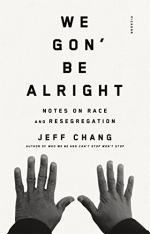|
This section contains 506 words (approx. 2 pages at 400 words per page) |

|
We Gon' Be Alright Summary & Study Guide Description
We Gon' Be Alright Summary & Study Guide includes comprehensive information and analysis to help you understand the book. This study guide contains the following sections:
This detailed literature summary also contains Topics for Discussion on We Gon' Be Alright by Jeff Chang.
The following version of the book was used to create this study guide: Chang, Jeff. We Gon' Be Alright: Notes on Race and Resegregation. Picador, 2016.
In the introduction, author Jeff Chang highlights contemporary issues around race in America that have been exacerbated by resegregation and culture wars. In this book, Chang will look at some of the ways in which the United States has slid back toward segregation in the years since the Civil Rights movement.
In the first essay, Chang writes about how Donald Trump capitalized on white fears throughout his presidential campaign, further polarizing the country while both reflecting and contributing to rising xenophobia and white nationalism. He then writes about how diversity has become co-opted as a concept, often serving the needs of white people to seem elite and non-racist instead of actually reducing segregation or discrimination. Chang writes about affirmative action and those who protest it, as well as how so-called diversity efforts have been harnessed by big businesses for capitalist gain.
In the second essay, Chang writes about student protest. He explores how campuses not only lack representation of minority groups among faculty and staff but are also places of active discrimination where minority students often feel unsafe and unwelcome. Chapter Three, The Odds, on Cultural Equity is about the lack of representation of minority groups in popular culture, the arts, and the media. Chang writes about the Oscars and Hollywood as white-washed industries as well as how arts funding disproportionately benefits majority-white cultural institutions.
The next essay is about resegregation more specifically as it explores gentrification, income disparity, and shifting demographics in American cities. Chang explores the history of cities in which affluent white people fled to the suburbs and poor people of color were pushed into inner-city subsidized housing. He notes that this has reversed in recent years with urban gentrification and the decline of aging suburbs. Urban centers are now typically more affluent and white-washed while suburbs have become lower-income areas. Demographic shifts in recent years have not led to integration but rather to a new kind of racial and income-based segregation.
In Hands Up: On Ferguson, Chang writes about police brutality, specifically the death of Michael Brown Jr. at the hands of a Ferguson police officer which prompted a long series of protests and civil unrest against systemic racism in the police force. Chang outlines the events of Brown's death and the year of protests that followed, exploring the rise of movements like Black Lives Matter. The final chapter is about Chang's personal experience as an Asian American from Hawai'i. He writes about Asian American identity, discrimination, and his own activism. He calls on Asian Americans to advocate not only for their own rights but for justice and equity for all.
In the Conclusion, Chang does a close analysis of Beyonce's film Lemonade. He uses this as a metaphor for the transition from betrayal to anger to eventual reconciliation. He calls for love and grace in revolution and civic activism, believing that redemption is possible.
Read more from the Study Guide
|
This section contains 506 words (approx. 2 pages at 400 words per page) |

|



